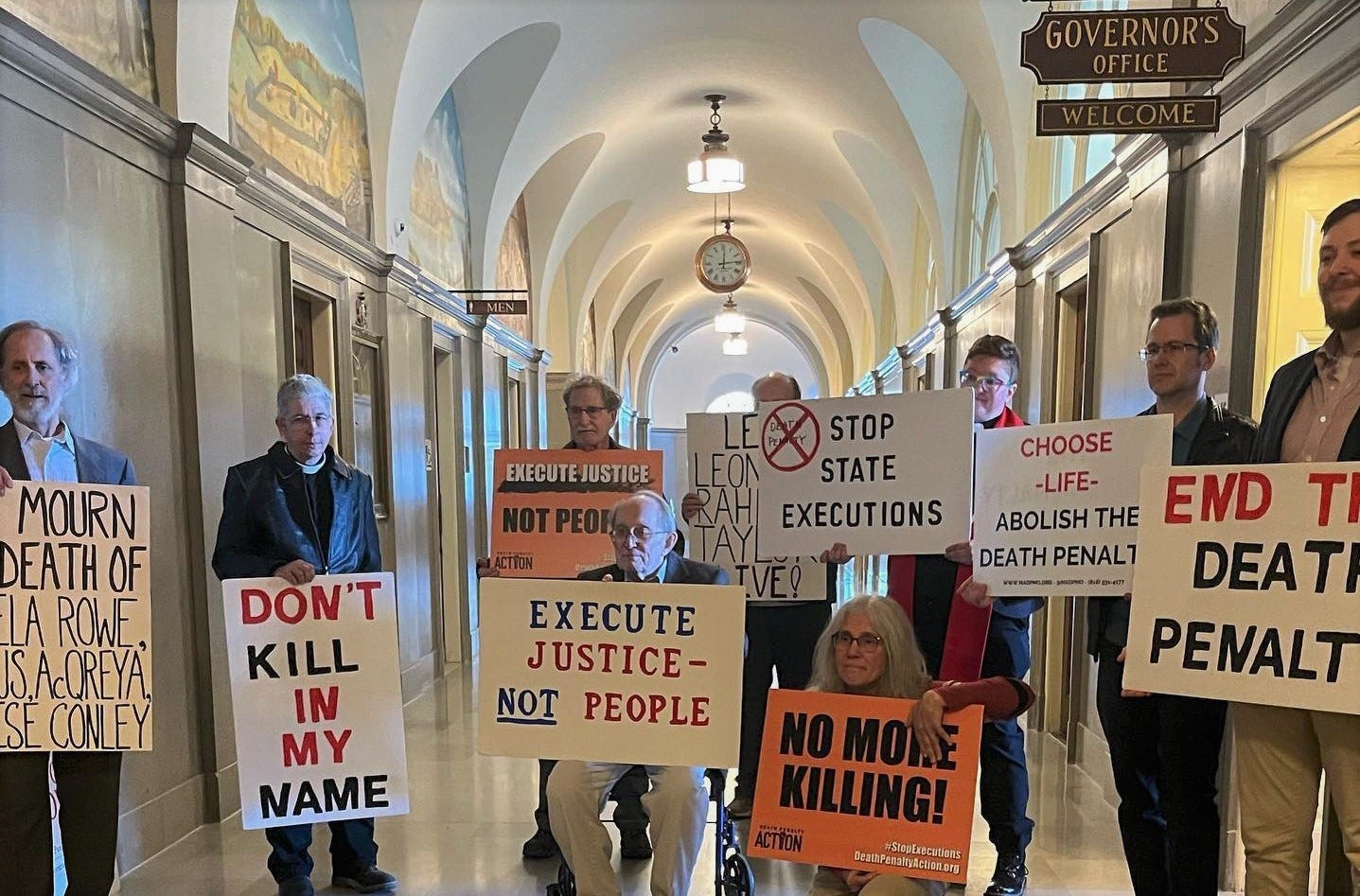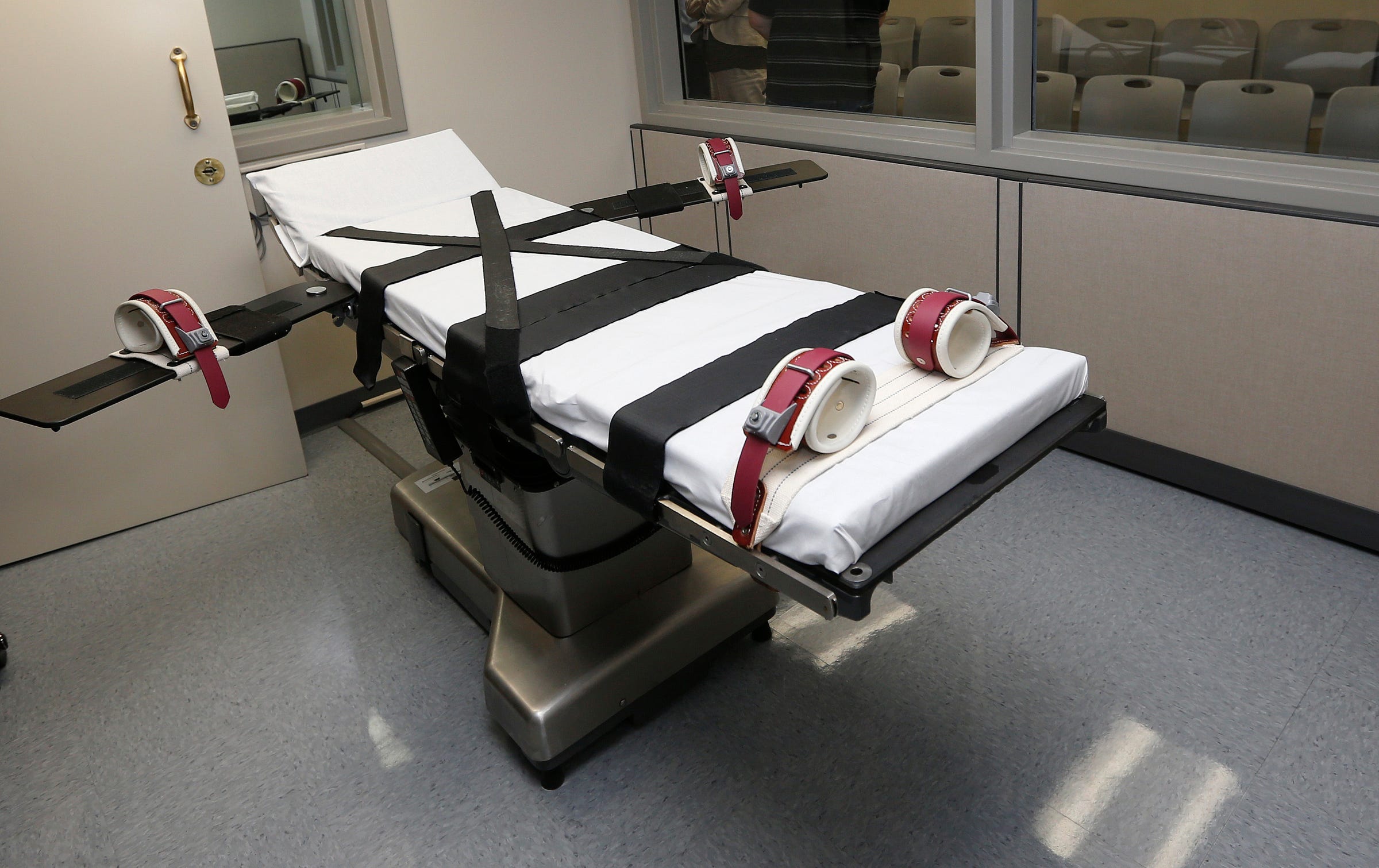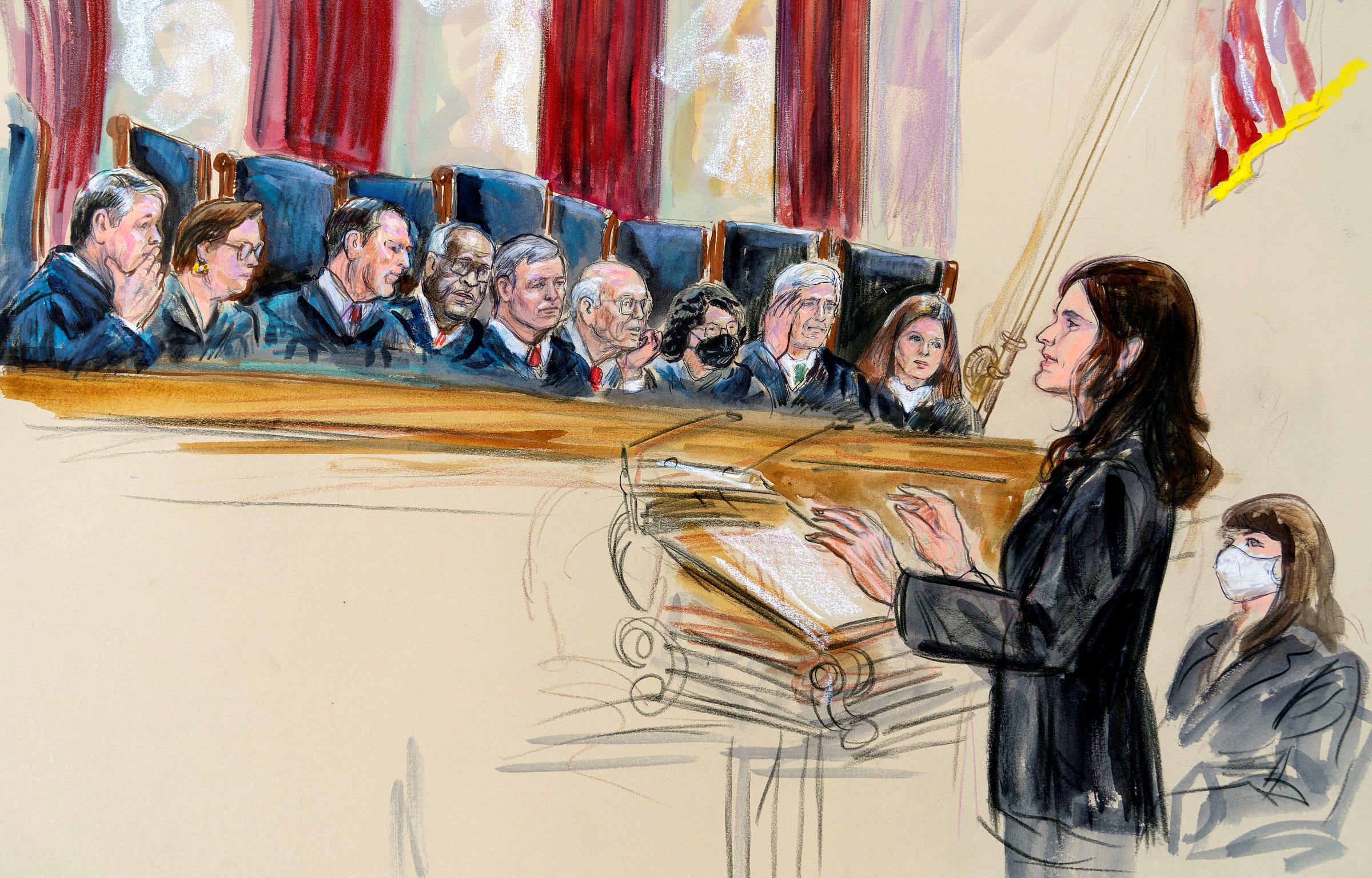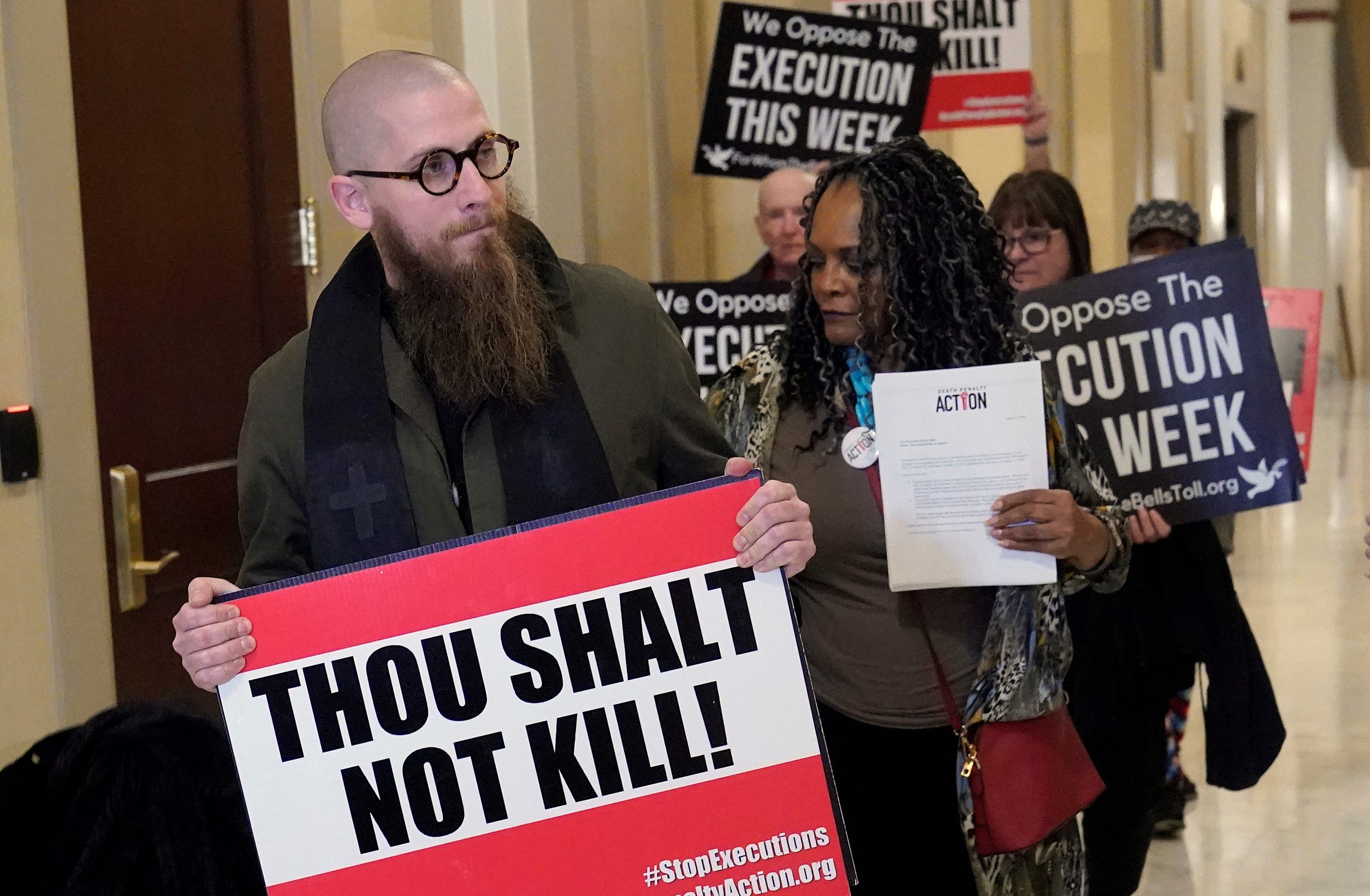Denying Religious Freedom During an Execution
Last year, a U.S. Supreme Court ruling mandated that states allow spiritual advisors into execution chambers to touch and pray for those about to be killed. Over the past four months, at least seven people in three states have had a spiritual advisor present during their execution. That included two Christian pastors in Missouri over the past 10 weeks.
But then on Tuesday (Feb. 7), Missouri executed Leonard “Raheem” Taylor after refusing to allow his Muslim spiritual advisor to be by his side.
Taylor’s case raised lots of concerns. He was convicted of murdering his girlfriend Angela Rowe and her three children in 2004. Like the previous two people executed and one-quarter of those currently eligible for execution in Missouri, he was sentenced under former St. Louis County Prosecutor Bob McCulloch, who has a well-documented history of racial bias.
Additionally, there is compelling evidence that Taylor was over 1,800 miles away in Ontario, California, at the time the murders occurred. Numerous people claim to have seen or spoken with the victims after Taylor left the state, and the key witness for the prosecution said he was harassed by police and recanted his statements well before the 2008 trial began. The other pillar of the state’s case was testimony from a medical examiner who actually changed the time-of-death estimate to align with the prosecutor’s timeline of events.
Yet, Taylor was killed before his claim of innocence could be thoroughly vetted.
As if that weren’t bad enough, he was also killed without his spiritual advisor, Anthony Shahid, who is affiliated with the Masjid Al-Tauheed mosque in St. Louis. The Missouri Department of Corrections (MDOC) denied Taylor’s request for Shahid to be in the execution chamber.

We asked both MDOC and Gov. Mike Parson’s office about the denial and if they were concerned it appeared like religious discrimination to deny a Muslim spiritual advisor after allowing Christian ministers.
“Leonard Taylor was NEVER denied a spiritual advisor. He chose early in the process NOT to have one. DOC’s policy requires individuals to request all witnesses and a spiritual advisor two weeks prior to the execution date,” Parson’s spokeswoman Kelli Jones insisted in an email. “Twenty-four hours before Leonard Taylor’s execution date, he decided to request a spiritual advisor and additional witnesses.”
When we requested the MDOC policy, Jones referred us to MDOC, who we had already contacted. Karen Pojmann, MDOC communications director, initially told us Taylor “signed a document” on Jan. 25 declining “witnesses and/or a spiritual advisor present at the execution.” She added, “It wasn’t until the day before the scheduled execution that he asked to have his spiritual advisor present. He was informed that it was too late to make that change.”
When we again requested the policy, Pojmann responded, “It’s a procedure, rather than a policy.”
So it appears that MDOC never made a policy containing a deadline regarding spiritual advisors in the execution chamber after last year’s Supreme Court ruling — even as the state allowed spiritual advisors to be present. The only policy and document they can point to concerns possible witnesses, like friends and family of the incarcerated person, who can be present outside the death chamber in a separate room at the time of the execution.
Additionally, the statements from MDOC and the governor’s office don’t align with what state officials said in official court filings earlier this week. Both Taylor’s attorneys and Missouri Assistant Attorney General Andrew Crane acknowledged in filings a request for Taylor’s spiritual advisor to be present in the chamber was made on Saturday, Feb. 4 — two days before the timeline MDOC said publicly and more than three times longer than the 24-hour claim by the governor’s office.
Taylor’s attorneys filed suits in state and federal courts to stop the execution unless Shahid was allowed into the execution chamber. They argued that Taylor was told the form he signed two weeks earlier was about family members as witnesses, which he didn’t want. Additionally, the suits noted that the form he signed did not include an option to designate a spiritual advisor for inside the chamber. Instead, the form follows a Missouri statute allowing the condemned person to have two “ministerial counselors” in the adjacent witness room along with up to five other witnesses. Neither the statute or the form addresses having a spiritual advisor in the actual execution chamber, which presumably would not be an option for two ministerial counselors.
“Given the right to have a spiritual advisor in the execution chamber, [the MDOC is] required to provide a process that satisfies due process,” Taylor’s suit read. “The MDOC’s unstated, unclear, and arbitrary policy, which resulted in the refusal to admit his spiritual advisor of the Muslim faith, but permitted the two Christian spiritual advisors to be present for the executions of Amber McLaughlin and Kevin Johnson, violates Mr. Taylor’s First Amendment rights under the Religious Land Use and Institutionalized Persons Act.”
Although the state of Missouri defended its denial of Taylor’s request in court filings, their attached exhibits show there is not actually a policy or set procedure for requesting a spiritual advisor to be in the room. In fact, the filing includes emails from attorneys for the previous two individuals executed showing them trying to figure out how to get a spiritual advisor in the chamber. In both cases, that was not considered covered by the witness form but was a request for “an accommodation.” As Greg Godwin, chief council for the Missouri attorney general’s office, noted in an October email, “The Warden considers these requests on a case‐by‐case basis.” Taylor’s Feb. 4 request for his spiritual advisor to be present was also called an “accommodation” request, but it was denied.
Additionally, while public statements said Taylor had to make the request two weeks in advance, the state told the courts they required seven days’ notice, insisting they needed to clear people for security reasons — even though Shahid had already been approved as a spiritual advisor for Taylor and cleared to meet with him in prison.
The Missouri Supreme Court on Tuesday rejected without an explanation Taylor’s suit regarding his spiritual advisor. These same justices were criticized by Justice Ketanji Brown Jackson in a dissent in Kevin Johnson’s case from November for not properly following Missouri law when they allowed Johnson’s execution to proceed. But Jackson and her fellow members of the nation’s highest court never got a chance to consider Taylor’s suit about his spiritual advisor. Although his attorneys filed an appeal with the Court of Appeals for the Eighth Circuit (one step before the U.S. Supreme Court would have seen it), they never got to consider the case because Taylor was killed before they could do so.

Was this a case of Islamophobia since the two previous Missouri executions allowed Christian ministers to be present? Was this a case where the state did not like that these spiritual advisors were speaking publicly about their experiences, such as Rev. Lauren Bennett noting that Amber McLaughlin died in pain last month? Was this a case where Taylor was confused by an unclear, arbitrary process and then was himself blamed for the confusion by those leading that process? Or was it a bit of all of the above?
Now that we’ve detailed what went wrong, this issue of A Public Witness will explore the U.S. Supreme Court’s recent record of requiring states to allow spiritual advisors in the death chamber and the advocates who were pushing Missouri’s leaders to do better on Tuesday.
Irreparable Harm
The execution of Taylor did not occur in a vacuum. The issue of spiritual advisors in the death chamber has reached the U.S. Supreme Court multiple times over the past four years. The justices have nudged the rules along, granting more and more rights to the condemned persons and their spiritual advisors. In Taylor’s case, the state of Missouri bucked that trend — though it’s not the first time a Muslim man suffered such a fate.
Exactly four years before Taylor’s execution, the Supreme Court justices voted 5-4 to overturn a stay of execution and allow Alabama to kill Domineque Ray on Feb. 7, 2019. The Court of Appeals for the Eleventh Circuit had ruled Alabama couldn’t execute Ray because the state refused to allow a Muslim imam in the death chamber even though the state allowed a Christian chaplain during executions.
Without explanation, the court’s majority ignored the disparity of treatment between Christians and Muslims and allowed the execution to proceed without a spiritual advisor. But Justice Elena Kagan blasted the “profoundly wrong” decision in a dissent signed by Justices Stephen Breyer, Ruth Bader Ginsburg, and Sonia Sotomayor.
“Ray has put forward a powerful claim that his religious rights will be violated at the moment the State puts him to death,” wrote Kagan, who called the treatment “religious discrimination.”
Kagan also pushed back against Alabama’s claims that Ray had not made his request in a timely fashion given unclarity in state statutes and the fact that “the prison refused to give Ray a copy of its own practices and procedures.”
The execution of Ray without his imam quickly sparked criticism from religious leaders and commentators across the political spectrum. Apparently in response to the public outcry, when the justices faced a similar case the next month, they changed their decision.
On March 29, 2019, a 6-3 vote of the justices granted a stay of execution for Patrick Murphy as Texas refused to allow him a Buddhist spiritual advisor in the execution chamber even though the state allowed Christian and Muslim chaplains. Chief Justice John Roberts and Justice Brett Kavanaugh changed their position to join the four more liberal justices.
“The Constitution prohibits such denominational discrimination,” Kavanaugh wrote.
Justice Samuel Alito wrote a dissent, joined by Justices Clarence Thomas and Neil Gorsuch, arguing against the stay. Like Texas state officials, they argued Murphy had requested a spiritual advisor too late and had raised the claim too late in court filings. But the court’s majority dismissed such claims about timeliness.
In response to the Murphy ruling, Texas and Alabama decided that instead of allowing clergy of various traditions into the execution chamber, they would instead bar all spiritual advisors. Those decisions sparked new litigation.

On June 16, 2020, the justices granted a stay of execution to Ruben Gutierrez shortly before his scheduled execution in Texas because he wasn’t allowed to have a Catholic priest present. The justices sent the case back to the lower courts, which helped lead to a new policy allowing spiritual advisors in Texas. The justices similarly ruled on Feb. 11, 2021, that Alabama could not execute Willie Smith III without his pastor present.
“Alabama’s policy substantially burdens Smith’s exercise of religion,” Justice Kagan wrote in a decision signed by Justices Breyer, Sotomayor, and Amy Coney Barrett. “The law guarantees Smith the right to practice his faith free from unnecessary interference, including at the moment the state puts him to death.”
Smith was executed on Oct. 22, 2021, with Pastor Robert Wiley Jr. present, touching Smith’s leg, and praying. But by then, the high court had another case.
On Sept. 8, 2021, the justices blocked the execution of John Ramirez in Texas after he sued to have his Southern Baptist pastor touch him and pray out loud during the execution. Unlike the previous four cases that came from the court’s “shadow docket” and didn’t involve oral arguments, the justices actually decided to hear Ramirez’s case. Ahead of oral arguments, numerous religious groups filed amicus briefs encouraging the justices to grant Ramirez’s request, including the Anglican Church in North America, Baptist Joint Committee for Religious Liberty, General Conference of Seventh-day Adventists, National Association of Evangelicals, U.S. Conference of Catholic Bishops, and an interfaith group of spiritual advisors who had been present during executions.
Texas officials had argued against the stay, insisting that Ramirez had previously “explicitly disavowed any need for his pastor’s touch in the execution chamber,” had not followed some prison policies, and had raised issues “too late.” But in an 8-1 decision, the justices disagreed and sided with Ramirez.
“Ramirez is likely to suffer irreparable harm in the absence of injunctive relief because he will be unable to engage in protected religious exercise in the final moments of his life,” wrote Chief Justice Roberts, who also noted the state’s policies did not actually prevent what Ramirez requested.
Roberts also rebutted claims Ramirez raised issues too late. In addition to saying it wasn’t true, the chief justice urged execution officials to “specify reasonable rules” and be more proactive in their protocols: “Timely resolution of such claims could be facilitated if States were to adopt policies anticipating and addressing issues likely to arise. Doing so would assist both prison officials responsible for carrying out executions and prisoners preparing to confront the end of life according to their religious beliefs.”
Texas executed Ramirez on Oct. 5, with Rev. Dana Moore there praying.
After years of the high court wrestling with this issue and granting more and more rights to condemned persons and clergy, Missouri invoked unclear and unwritten rules to justify killing a Muslim man without his spiritual advisor present.
Last Rites & Rights
As Taylor’s attorneys filed legal appeals on Tuesday, advocates against the death penalty joined the cause, publicly pushing Gov. Mike Parson, Attorney General Andrew Bailey, and the Department of Corrections to intervene and allow Taylor’s spiritual advisor to perform his constitutionally-protected duties.
“There is definitely something wrong where spiritual advisors are allowed for those who are Christian but not who are Muslim,” declared Rod Chapel, president of the Missouri NAACP, as he stood on the steps of the state Supreme Court building on Tuesday during a rally hosted by Missourians to Abolish the Death Penalty.
“Here the law is taking away our very morality, our ability to pray even at the worst moment that you can imagine, when a state-sanctioned murder is occurring,” he added. “Injustice compiled upon injustice.”
Others at the rally also pushed for allowing Taylor’s spiritual advisor, including one of us (Brian). And joining the rally virtually to offer comments were Cantor Michael Zoosman, a Jewish former prison chaplain, and Rev. Jeff Hood, who last month stood by Scott Eizember as he was executed by Oklahoma (although the state initially said they would not allow Hood in the chamber because he had previously been arrested during a peaceful anti-death penalty protest in Texas).
“They’re not just denying him spiritual direction, spiritual comfort — although that they are — what they’re actually denying are his constitutional rights,” Hood said Tuesday.

A few hours later, Rev. Darryl Gray spoke at a rally in St. Louis just a couple of hours before Taylor’s execution. The pastor of Greater Fairfax Missionary Baptist Church in St. Louis, Gray was the first spiritual advisor in Missouri to be by the side of a condemned person during an execution. He blasted the state for refusing to make religious accommodations for Taylor, even if it had been requested late.
“They’ll give him a good [last] meal, but they won’t give him a spiritual advisor?” Gray said. “To hell with a good meal!”
“You’re telling me that the governor who sits in Jeff City, who continues to say that he is a good believer, that his belief does not rise to giving this person someone, a spiritual advisor who will walk with him and pray with him and be with him?” Gray added about his fellow Baptist.
Gray also criticized the state for justifying the denial “because he signed a form some weeks ago. We’re saying that you did not communicate clearly what that form meant. And even if you did, even if he changed his mind on death row, surely your humanity should supersede some damn policy! It makes no sense!”
If Missouri had followed the advice of Chief Justice Roberts in the Ramirez case on spiritual advisors, it might have had more flexibility to show some of the humanity Gray urged. But instead of being proactive, state officials have apparently not created new policies or forms even as they’ve been allowing clergy in the death chamber — thus creating a system ripe for confusion and the appearance of discrimination.
It is also troubling that state officials refuse to even tell the truth about the process. Public statements by the governor’s office and the Department of Corrections contradict each other and what the state said in official court filings. Such inconsistencies and false claims help create a system where confusion and the appearance of discrimination can occur.
We should demand better, especially when we’re literally dealing with an end-of-life moment that cannot be fixed or redone. The First Amendment’s religious liberty protections don’t include a death row exception. So out-of-date forms, unwritten rules, and contradictory claims should not be acceptable justifications for denying a spiritual advisor.
It’s bad enough that the state wants to usurp the role of God and decide when lives should end. But it’s even worse to close the door on those who provide spiritual care.
As a public witness,
Brian Kaylor & Jeremy Fuzy




Excellent article. If only there was a way for *every* religious person to know about this awful, ongoing travesty! It is hard for me to picture a person of any religious tradition, thinking it a good idea to deny access to a person’s clergy at the moment of execution. Monstrous!
Thank you for this article. Just dreadful.